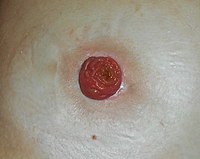
Photo from wikipedia
BackgroundThe creation of a diverting loop ileostomy is associated with the risk of readmission due to stoma-related complications. We hypothesized that the assessment of our institution-specific readmissions following ileostomy creation… Click to show full abstract
BackgroundThe creation of a diverting loop ileostomy is associated with the risk of readmission due to stoma-related complications. We hypothesized that the assessment of our institution-specific readmissions following ileostomy creation would help identifying at-risk groups which should be the focus of future preventative strategies.MethodsPatients who underwent loop ileostomy formation from 2009 to 2013 were reviewed. We evaluated readmissions within 30 days after discharge following loop ileostomy construction. Possible associations between readmission and demographic, disease-related and treatment-related factors were assessed using univariate and multivariate analyses.ResultsOut of 1267 patients undergoing loop ileostomy construction, 163 patients (12.9%) were readmitted. The main causes of readmissions were organ/space infections (43, 3.4%), small bowel obstruction/ileus (42, 3.3%) and dehydration (38, 3%). Independent factors associated with overall readmission were cardiovascular (OR = 2.0) and renal comorbidity (OR = 2.9), preoperative chemo/radiotherapy (OR = 4.0), laparoscopic approach (OR = 1.7) and longer operative time (OR = 1.2). Cancer diagnosis was associated with reduced readmission rates (OR = 0.2). Independent factors associated with readmission due to dehydration were chemo/radiotherapy (OR = 4.7) and laparoscopic approach (OR = 2.6).ConclusionsDehydration associated with diverting ileostomy creation was relevant as an individual cause of readmission, but its overall incidence was relatively rare. Dedicated strategies to prevent dehydration should be directed to patients who received chemoradiotherapy and/or laparoscopic surgery.
Journal Title: Techniques in Coloproctology
Year Published: 2017
Link to full text (if available)
Share on Social Media: Sign Up to like & get
recommendations!